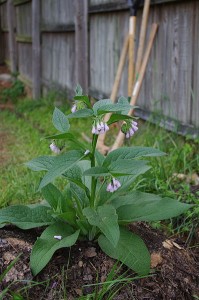An Herbal Compost Tea for Your Plants
Recently, I had a chance to hear University of Minnesota Extension Master Gardener Shari Mayer from Dakota County talk about growing and using herbs. Shari has been a big part of the herb gardens at UMore Park for many years and does a lot of experimenting with herbs at her home.

Her talk was filled with information, but one of the most interesting parts was using herbs — particularly comfrey — to create a very potent compost tea. This is similar to an idea I saw in Gayla Trail’s recent book Easy Growing: Organic Herbs and Edible Flowers from Small Spaces (Clarkson Potter 2012). Trail recommends cutting up all the parts of herbs that you might not be eating — stems, flowers, leaves — into pieces and then add water to this and let it sit. (Her ratio is one part plant pieces to four parts water.) She also adds a tablespoon of molasses, but that is optional. Then, let the bucket sit for one to three days, stirring a few times a day to keep it aerated. Later, you strain out the plants and pour the compost tea on your garden beds.
Mayer uses comfrey specifically for this kind of herbal compost tea because it disintegrates somewhat into the water and it creates a compost liquid with almost ideal levels of nitrogen, phosphorous and potassium (NPK) for home gardens. The levels are 1.8/.5/5.3, Mayer says. Comfrey decomposes readily, and the liquid helps pull up trace minerals from the soil to make them more available to the plants.
To make her herbal compost tea, Mayer takes a five gallon bucket and fills it 1/2 to 2/3 full of comfrey leaves, stalks and flowers. She adds water to fill the bucket and let’s it sit for a few days. When it begins to stink, it’s time to spread it on the garden. I imagine you could aerate the mixture, as Trail suggests, to keep it from stinking and perhaps to decompose more.
This is such an intriguing idea, I am definitely going to try it this year. What’s the best new idea for gardening you have heard this winter?
—Mary Lahr Schier
